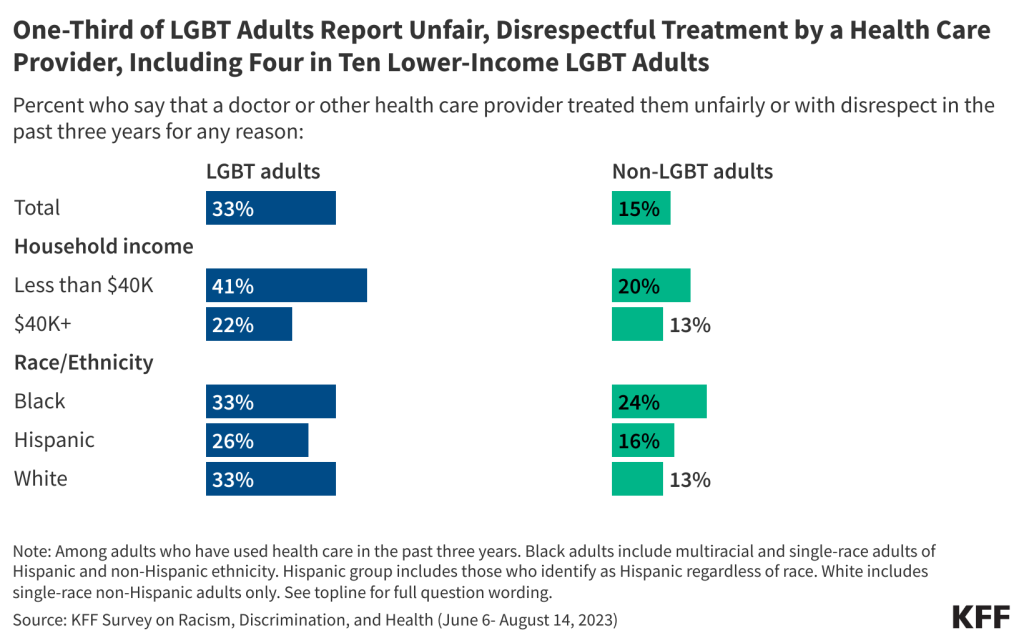
The independent source for health policy research, polling, and news.
Survey: LGBT Adults Are Twice as Likely as Others to Say They’ve Been Treated Unfairly or with Disrespect by a Doctor or Other Health Care Provider
1 in 5 LGBT Adults Say They’ve Experienced Homelessness During Their Lives
A third (33%) of LGBT adults say that a doctor or other health care provider treated them unfairly or with disrespect in the past three years – a rate twice as high as reported by people who don’t identify as LGBT (15%), a new KFF survey reveals.
The shares who report unfair or disrespectful treatment are similar among LGBT adults across racial and ethnic groups, though Black and Hispanic LGBT adults are more likely than White LGBT adults to say that they experienced poor treatment specifically due to their race or ethnic background.
In addition, LGBT adults are more likely than non-LGBT adults to report other negative experiences with a health care provider in the past three years, including a provider assuming something about them without asking (40% v. 17%), suggesting they personally were to blame for a health problem (32% v. 15%), or ignoring a direct request or question they asked (32% v. 14%).
“There is no good reason twice as many LGBT adults should be reporting being treated poorly by the health system compared to non-LGBT adults,” KFF President and CEO Drew Altman said. “Health professionals and health care institutions need to take a hard look at these data and themselves.”

Substantial shares of LGBT adults report a recent negative experience with a provider that led to consequences, such as making them less likely to seek care (39%), leading them to switch providers (36%), or causing their health to get worse (24%).
Most LGBT adults (60%) say that they feel they have to be very careful about their appearance in order to be treated fairly and/or prepare themselves for insults when visiting a doctor or other health care provider.
This new report about LGBT experiences draws on data from KFF’s Survey on Racism, Discrimination, and Health, which examines those issues not only in health care but in other aspects of society, and their relationship to people’s health and well-being.
LGBT Adults More Likely to Experience Homelessness and Report Mental Health Challenges
The survey finds that 1 in 5 (22%) of LGBT adults say that they experienced homelessness at some point in their lives – twice the share among non-LGBT adults. At least a third of lower-income LBGT adults (39%) and Black LGBT adults (35%) say they experienced homelessness during their lives.
When asked to rate their own mental health, 39% of LGBT adults say it is “fair” or “poor.” This includes larger shares of younger LGBT adults (ages 18-29). Overall, about half (54%) of LGBT adults report feeling anxious either “always” or “often” in the past year, while a third report feeling lonely (33%) or depressed (32%) at least often. These rates are all about double the shares among non-LGBT adults.
LGBT adults who report experiencing some form of discrimination in their daily lives are more likely to report feeling lonely, depressed or anxious in the past year than those who rarely or never experience discrimination.
About four in ten (44%) LGBT adults say that they or a family member has ever experienced a severe mental health crisis that resulted in serious consequences such as homelessness, hospitalization, incarceration, self-harm or suicide – about twice the share of non-LGBT adults who report this (19%). Those with large support networks of family and friends are less likely to report such experiences compared to those with small support networks.
Nearly half of LGBT adults (46%) say there was at time in the past three years when they needed mental health services but didn’t get them, including two-thirds (68%) of LGBT adults who describe their mental health as “fair” or “poor.” Among those who received or tried to receive mental health care, roughly half say it was difficult to find a provider who could relate to their background and experience (51%), would take their health insurance (49%), or that they could afford (48%).
The KFF Survey on Racism, Discrimination and Health is a probability-based survey conducted online and via telephone with a total of 6,292 adults, including oversamples of Hispanic, Black, and Asian adults conducted June 6-August 7, 2023. Respondents were contacted via mail or telephone; and had the choice to complete the survey in English, Spanish, Chinese, Korean, or Vietnamese. Survey methodology was developed by KFF researchers in collaboration with SSRS, and SSRS managed sampling, data collection, weighting, and tabulation. The margin of sampling error is plus or minus seven percentage points for LGBT adults (n=521); and two percentage points for non-LGBT adults (n=5,771). LGBT adults are those who identify as lesbian, gay, bisexual, and/or transgender.